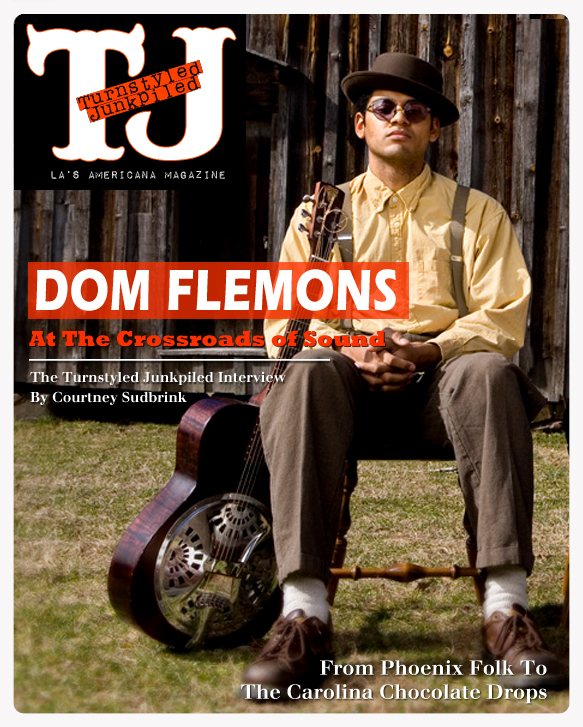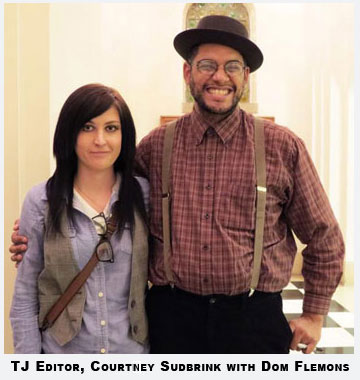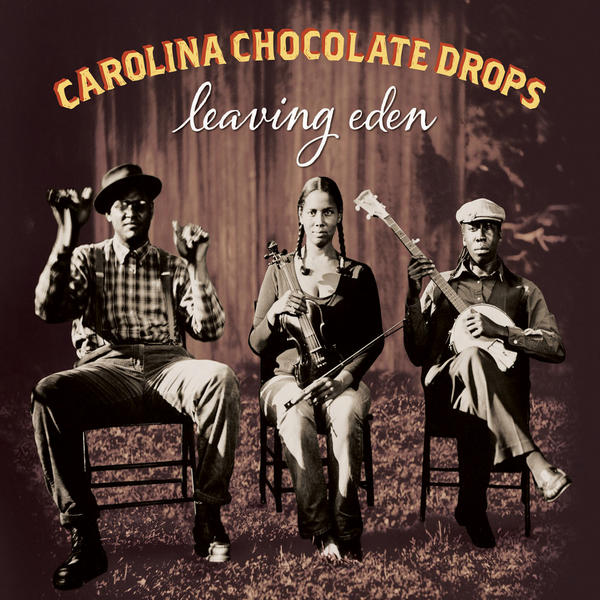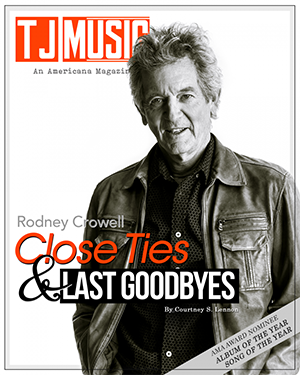By Courtney S. Lennon, Editor
Dom Flemons is a character. A refreshing burst of in-your-face, Old-Time tradition, his presence in today’s music is essential. Shaped by a diverse background and never-ending, intensive journey through the landscape of American music, he is a modern-day reminder of the true artistry that can be achieved by interpretation and performance.
 Best known for his involvement in the Grammy Award winning, Durham, North Carolina based, all black string band, the Carolina Chocolate Drops, Flemons has become a strong voice and leader in the Roots community. Possessing tremendous talent, remarkable scholastic aptitude and never-ending, energetic enthusiasm, his dedication to keeping history alive and forward moving is inspirational. His gift, sharing his enlightenment in a way that digs deep and pushes boundaries, yet isn’t forceful.
Best known for his involvement in the Grammy Award winning, Durham, North Carolina based, all black string band, the Carolina Chocolate Drops, Flemons has become a strong voice and leader in the Roots community. Possessing tremendous talent, remarkable scholastic aptitude and never-ending, energetic enthusiasm, his dedication to keeping history alive and forward moving is inspirational. His gift, sharing his enlightenment in a way that digs deep and pushes boundaries, yet isn’t forceful.
An Arizona native, Flemons began his immersion into music at an early age. Coming from a well-rounded family who advocated appreciation of various types of music, ranging from Gospel to Rock and Roll to Jazz to Pop and Soul, he was exposed to a wide scope of styles, which helped lead him to his inevitable path in life as one of today’s foremost creative forces and song interpreters.
It was at the age of 16 that Flemons’ life changed drastically, when he began to discover Folk music. It was the words and stories, which made this particular genre standout to him as the fundamental cornerstone of all music, which became the foundation of his education and growth as an artist. Listening to artist like Bob Dylan, Phil Ochs and Dave Van Ronk, he started to see the harmonious blend between  poetry and music. Having previously written spoken word poems, Folk music led Flemons to the realization that an individual could accompany their own words as a solo artist, by picking up an acoustic guitar. And Folk tradition also allowed him to combine his penchant for history along with his love of song.
poetry and music. Having previously written spoken word poems, Folk music led Flemons to the realization that an individual could accompany their own words as a solo artist, by picking up an acoustic guitar. And Folk tradition also allowed him to combine his penchant for history along with his love of song.
“One thing that drew me into Dave Van Ronk, is that he’d talk about the songs. There was all this interesting history and anecdotal information that’s disseminated just through a song,” Flemons explained.
Another important part of Flemons’ development stemmed from his discovery of Mike Seeger’s album, Solo: Old Time Country Music. It was with Seeger’s album that Flemons started to understand the existence of a roots music crossroads. Having incorporated elements of Folk and Country, Seeger’s particular brand of fusion music was a key part of Flemons’ artistic evolution.
“Mike’s album really opened up the idea of combining all these styles into its own music, so that it was authentic to both styles. It felt grounded. It didn’t feel like fusion, even though it technically was fusion music,” he explained.
Flemons’ exposure to Seeger’s album, led him to further explore Country, Country-Blues and Old Time Music, collectively. And as he continued to perform, he found ways of combining these different strains together and learned to either enhance traditional pieces or present them true to the original form.
Despite the fact that on the surface, Country and Folk music are most often associated with white artists and audiences, Flemons points out that although there is truth to it, history reveals the fundamental involvement of African American players in both genres. Beyond just the influence of acoustic-blues artists like Leadbelly, African Americans were involved with many of the forefathers of Bluegrass and Country music.
“Bill Monroe, Jimmy Rogers, Hank Williams and The Carter family – all of them have these kind of allusive black figures, black musicians and singers that influenced them, helped them along, played with them and wrote,” Flemons explained.
It is undeniable that African Americans played an important role in the development of Folk and Country Music, but most Folk audiences consist primarily of white people. Not only had Flemons anticipated this, but he has also accepted it.
“One of those things that happens when you’re a black person playing Folk music, is that there isn’t really a black Folk audience per say. A lot of people ask “What’s it like playing for white audiences?” To me it’s like “That’s what I expected when I was getting into it,” he said.
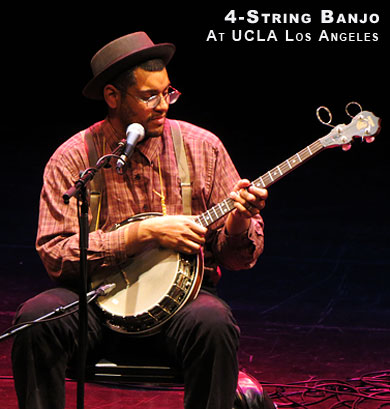 As time progressed, Flemons started to further recognize his own roots in the music he was passionate about. His next musical endeavor, leading him closer to finding a sense of community among others like him.
As time progressed, Flemons started to further recognize his own roots in the music he was passionate about. His next musical endeavor, leading him closer to finding a sense of community among others like him.
A multi-instrumentalist, he began to play the Banjo in college, when he borrowed a 5-string from a friend, who had removed the first string and turned it into a 4-string. After borrowing the banjo for a summer, Flemons purchased a 4-string. His background as a drummer, allowing him to incorporate elements of percussion into his strumming, that would ultimately lead to an unintentional, but now, differentiating style of playing.
“I always played the banjo like a drum that you could play chords on. In that way, I was unique in how I could approach the music on the banjo. I had a very diverse palate of stuff I listened to. For years I just played anything. I played Beatles songs, Paul Simon, Old-Time numbers, Blues… and I’d also play slide banjo. And no one was really telling me ‘That’s not a conventional way of playing the banjo.'”
His way of playing, also due in part to his environment. Because of Arizona’s sprawling rural pockets, it is a hard place to play music in general. And particularly, Folk music is not embraced on a large scale. Rather, loud, harsher forms like Punk, Hip-Hop, and Metal dominate. But, this only added to the Flemons’distinct way of acoustic expression.
 “I learned to play hard and forceful and get people’s attention through that intensity. When I moved to North Carolina, I didn’t need to play nearly as hard, but the intensity was part of what made the Carolina Chocolate Drops sound. We had a great, intense fiddle and banjo music and I played guitar in an intense way to drive the music, as well. The combination of both of those things really made an impact,” he said.
“I learned to play hard and forceful and get people’s attention through that intensity. When I moved to North Carolina, I didn’t need to play nearly as hard, but the intensity was part of what made the Carolina Chocolate Drops sound. We had a great, intense fiddle and banjo music and I played guitar in an intense way to drive the music, as well. The combination of both of those things really made an impact,” he said.
Flemons first arrived in North Carolina in 2005, when he attended an event that would change his life, thanks to his newly formed talent as a banjoist. The banjo, ultimately playing a role as both a unifying and driving force in Flemons’ life and lessons. An instrument most often used in traditional, Celtic-derived Southern styles, the banjo is actually an African instrument. The Black Banjo Gathering in Boone, North Carolina, a place where Dom could feel at home amongst other Roots, Folk and Traditional artists.
“One of the most important things about the Black Banjo Gathering, besides it being an academic event in which a lot of great minds that were studying different aspects of the banjo as an African derived instrument, was getting different black musicians who were interested in this type of music together. And that’s something that where we had a community of people, all of us know we’re out there instead of it feeling like we’re all in our own separate island,” Flemons said.
The Black Banjo Gathering, not only a place where he would learn about his own history and expand his musical technique, but it was also where he would first meet his mentor and future band-mates Rhiannon Giddens and Justin Robinson (now departed from the group). It was also an opportunity to connect with one of his heroes, Mike Seeger.
 “I struck up a conversation with [Mike], very starstruck and then I got to hang out with him a bunch. I told him how much I enjoyed his music, talked to him on the phone, went to his house a half a dozen times before he passed away. I found out as I was going, he had been suffering from a very intense lung and throat cancer. He was on his last years and I was very fortunate to spend four years in good communication. As the Carolina Chocolate Drops started, he was very supportive of us from the get go and was a real advocate of our group.”
“I struck up a conversation with [Mike], very starstruck and then I got to hang out with him a bunch. I told him how much I enjoyed his music, talked to him on the phone, went to his house a half a dozen times before he passed away. I found out as I was going, he had been suffering from a very intense lung and throat cancer. He was on his last years and I was very fortunate to spend four years in good communication. As the Carolina Chocolate Drops started, he was very supportive of us from the get go and was a real advocate of our group.”
Another key figure in Flemons’ life, who he met at the Black Banjo Gathering, was Joe Thompson. Both Seeger and Thompson, playing important roles in leading him to the Crossroads of American music. Thompson’s mentorship, as one of the last black fiddlers that had been active since the early 1970’s, a turning point in their progress of the Carolina Chocolate Drops (who at the time, called themselves The Sankofa Strings). For Flemons, playing with someone older on a regular basis, meant understanding the pragmatic role that music can play. Thompson’s wisdom and experience, invaluable to the group.
“It was a unique experience being able to play next to [Joe] and understand the music on a different functional level, because he grew up with the music being at a functional level in the community instead of it being a music that was always performed on stage. The casualness of being able to go down to his house on Thursday night and play with him consistently was amazing.”
Thompson was also the first to point out to Flemons that his style of banjo playing wasn’t consistent with any of the traditional styles. He introduced Flemons to claw hammer banjo and was due to this new found interest and awareness of Appalachian strains, along with his gravitation towards North Carolina native, Rhiannon that would act as a catalyst in Flemons move to Durham, a place where Old-Time and Bluegrass music were common. Thompson’s guidance, would also lend to a tightness to form among the original members of the trio. And he was the much needed link to all that Flemons had previously learned about traditional music.
“Joe was the connecting point to all of these things. The fiddle and banjo music, the string band stuff, that connection, that repertoire is what ended up being the root of all of it. Where you have these different fingers of this old time repertoire reaching out and mixing with work songs and spiritual music. Then the blues start coming out of that. You also find the string band stuff and put a drum set you start having the jug band forming out of that and country music as well,” said Flemons.
Finding a kinship with other black artists led to the formation of what would become one of today’s most groundbreaking and important acts, the Carolina Chocolate Drops. Coming onto the scene as an all black group, they have revolutionized the way Americana audiences look at Old-Time Music and understand their history. Staying true to themselves, the Carolina Chocolate Drops have been celebrated and embraced by the roots community, as well as recognized for their work on a larger scale by the Recording Academy, having won a Grammy for their album, Genuine Negro Jig, which they released on the Nonesuch label after having been discovered in a documentary film about Jug Band music called Chasin’ Gus’ Ghost. All success and accolades, not only well deserved, but instrumental in helping further their reach and impact.
“It’s just be ing able to connect with these different people and that’s something that is a very beautiful community builder. Even as we played out, even just to have, sometimes we had different black people say “I always really loved this type of music, but you know, I really appreciate you guys being out there.” Just sort of like a “Well, it’s known as white music, so there’s kind of an instant social dynamic that happened to many black people who may have liked music that was considered white, but they didn’t feel comfortable really embracing it. Some people do, some people don’t,” Flemons explained.
ing able to connect with these different people and that’s something that is a very beautiful community builder. Even as we played out, even just to have, sometimes we had different black people say “I always really loved this type of music, but you know, I really appreciate you guys being out there.” Just sort of like a “Well, it’s known as white music, so there’s kind of an instant social dynamic that happened to many black people who may have liked music that was considered white, but they didn’t feel comfortable really embracing it. Some people do, some people don’t,” Flemons explained.
Another thing that sets the Carolina Chocolate Drops apart from anyone else doing music today, is that they are the only national touring act that incorporates Minstrel Music into their diverse repertoire. The award winning, Genuine Negro Jig, even taking its name from a traditional minstrel song. But despite the negative social connotations attached to Minstrel music, with its foundations stemming from a racist society, Flemons points out the importance of carrying on the music.
“One of the things that’s important about minstrel music in general is that it is an important part of our history as a nation. That’s the main thing people need to take away from it. There’s beautiful music in it and there’s a lot of wonderful theatrical pieces in it, there’ s a lot of comedy in it, sometimes it’s very racist, but it comes from a racist society, which we still live in – that’s one thing that people forget. To not talk about it and not show it, is to openly deny that it ever existed,” Flemons said.
With their latest effort, Leaving Eden and the recent release of the Old-Time Jazz and Show-tunes heavy, The Uptown Strut under their original name, Sankofa (featuring Allison Russell in the absence of Giddens), Flemons and the Carolina Chocolate drops prove that no matter what they play, be it traditional pieces or original material, it never lacks freshness or sincerity. Though often times, performers are criticized for not writing their own songs, like Elvis Presley and Louis Armstrong before them, the Carolina Chocolate Drops prove that interpretation is every bit as valid as original material. With albums consisting primarily of cover songs, they act as an important reminder of the power in expression and a nod to the legacy of American Popular Music that helped shape us as a culture with a rich canon of widely known songs.
“The greatest success has been, people acknowledging that the banjo is an African American instrument. That’s probably the greatest thing that we can do, is just creating awareness that that is a part of our history,” he said.
At the age of only 29, Flemons posses wisdom far beyond his years. His vision, passion and humility, setting a precedent not only for up-and-coming artists, but human beings in general. He is the type of person who reminds us to look within ourselves and appreciate the true power in honesty and individuality. From that, he demonstrates the possibility of obtaining greatness through awareness and understanding. If Mike Seeger and Joe Thompson were still around, they would be more than proud. Flemons, one of this generation’s finest examples of integrity and a much needed role model for the future.
“Country Girl” by Carolina Chocolate Drops from Leaving Eden
Courtney S. Lennon
Latest posts by Courtney S. Lennon (see all)
- Billy Joe Shaver: August 16,1939 – October 28, 2020 - November 2, 2020
- You Are About To Become Involved With Van Dyke Parks! - July 13, 2020
- The Hero of Texas Music History - July 23, 2019

